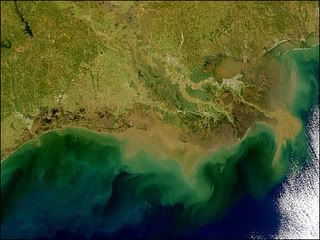Wednesday, April 17, 2013
Wednesday weirdness, women and wimps
A hedge fund CEO who supports privatization of public schools wants to "help" with the teachers' pension funds...
Overuse of fertilizer is killing us... on the other hand, it allows us to feed our ever burgeoning population.
Anyone remember bash.org? Best hits.
Women should know their bodies belong to them.
Ramping Up Renewables: Energy You Can Count On
Gabby Giffords speaks out about the senators who "filibustered the bipartisan gun background-check proposal".
Tuesday, January 06, 2009
Something that I've wondered about
California Liquid Fertilizer has been spiking its fertilizer with ammonium sulfate for the last several years, affecting the organic status of many farms, including organic behemoth Earthbound Farms.Sounds like China, doesn't it? I guess greed is universal and lying is automatic....It's a pretty epic story. The revelation that the fertilizer merchant (feel free to suggest better terms in the comments) was using non-kosher ingredients came from a former employee, who alleged that the company has been using ammonium sulfate since 1999. Inspectors confirmed the taint in 2005, even intercepting train cars of ammonium sulfate, but the California government didn't take action for several months, as the E. Coli in spinach outbreak consumed attention. In 2007, another organic fertilizer pulled its fertilizer, and another similar announcement is apparently coming soon.
Synthetic fertilizers were substituted because they cost less than 5% of the price of organic fertilizers. Yes, substituting a cheap ingredient for the more expensive, labeled ingredient usually goes over well.
Tuesday, June 10, 2008
The Dead Zone

Scientists have monitored the growth of these so-called dead zones since the late 1970s. They have tried to promote policies to reduce their size, without much success. Last summer, the dead zone along the Gulf of Mexico coast spanned nearly 8,000 square miles— its third-largest occurrence on record and roughly the size of Massachusetts.Everyone is to blame and no one will take responsibility. Finger pointing resolves nothing. In the mean time the Gulf continues to die. It's up to EIGHT THOUSAND square miles. What will the magic number be to galvanize people to act? It obviously must be from the ground up because politicians by their very nature will do nothing.Although states have tried to address the problem, cooperation among them is suffering, and federal leadership and funding are lagging. And now, scientists say, there is a new obstacle: the impact of ethanol production on water quality.
Spurred by recent ethanol mandates and, to a lesser extent, high commodity prices, U.S. farmers are planting record-size crops. From 2006 to 2007, corn acres rose by about 15 million, mostly in the Mississippi River basin. Mid-Atlantic farmers are expected to plant 500,000 more acres of corn, soybeans, and wheat this year than they did in 2006, a 7 percent jump.
So where does one begin?
Update 6/11: RB of The Wicked Witch of the Web has posted on this as well as written an article.
Saturday, February 16, 2008
The push for ethanol is having an effect on food prices and availability

Joseph Romm:
And from Romm's article in Salon: (my bold)I have an article in Salon on the insanity that is America’s ethanol policy. The new energy bill sets this country on a path to finish the assault on the world food supply begun by the (even lamer) 2005 energy bill. As I explain, our ethanol policy does not help fight global warming, but it does threaten food supplies:
In just the past two years, food prices have jumped 75 percent in real terms…. The Economist points out the amazing statistic that “the demands of America’s ethanol program alone account for over half the world’s unmet need for cereals.”
By law (the 2005 energy bill) we are going to increase corn ethanol production at least 50% over the next few years. And the new energy bill will probably require corn ethanol to triple from current levels!! But current levels are already bringing havoc down on the global food market.
In the Energy Policy Act of 2005 -- a rather lame collection of giveaways to the energy industry -- Bush and the Republican Congress tripled the mandated biofuel requirement to 7.5 billion gallons by 2012. Again, corn ethanol is the only plausible biofuel that can meet the vast majority of that target. Also helping corn ethanol are the huge subsidies the industry gets and a large tariff that keeps out Brazilian ethanol made from sugar -- ironically the one food-based ethanol that is a big reducer of greenhouse gases compared with gasoline.Exactly.
Unfortunately, most biofuels are not a realistic climate solution for one simple reason: Biofuels from most food crops or from newly deforested lands do not provide a significant net decrease in greenhouse gas emissions -- and some may cause a net increase. Most life-cycle analyses show that corn ethanol has little or no net greenhouse gas benefit compared with gasoline because so much energy is consumed to grow and process the corn.
In fact, recent research, led by Nobel laureate Paul Crutzen, found that corn ethanol might generate up to 50 percent more greenhouse gases than gasoline, when you account for the extra emissions of nitrous oxide, a potent greenhouse gas, from increased use of artificial fertilizer. That same study found that the favorite biofuel worldwide, biodiesel from rapeseed, releases up to 70 percent higher total greenhouse gas than regular diesel.So... we will starve more of the world as we pollute even more and then sadly admit defeat and come crawling back to petroleum? Or will we be able to stop this insanity and develop less polluting more efficient biofuels? Do we have to go to the edge of the cliff every time before we can pull back and assess? Why does the promise of money erase all common sense?
As for developing countries, "Biofuels are rapidly becoming the main cause of deforestation in countries like Indonesia, Malaysia and Brazil," explains Simone Lovera, managing coordinator of the Global Forest Coalition. In part because of the burning of forests to clear land for palm oil production, Indonesia has become the world's third-leading producer of carbon emissions!
Update: Blue Girl at Blue Girl, Red State:
Across Africa NGOs and scientists are increasing their calls for a moratorium on new biofuels projects as millions and millions of acres of prime agricultural land in sub-Saharan Africa are switched from food production to biofuel production.
African governments, wooed by the prospect of a "Green Opec" and encouraged by their counterparts in industrialized nations have taken the bait; hook, line and sinker.
The prospect of being a part of a "green revolution," complete with promises of exports, job creation and energy security has seen countries converting prime cropland at breakneck speed - on the least food-secure continent on the face of the earth - has prompted African civil society groups to call for a time-out on further crop-switching for the near term. "We need to protect food security, forests, water, land rights, farmers and indigenous peoples from the aggressive march of agrofuel developments," reads the call for a moratorium.
In reality, the switch to biofuels crops has forced small farmers off the land, led to rising food costs and provided minimal benefits for local populations.
In Mozambique last week food riots erupted as government efforts to control the prices of bread and fuel failed, collapsing under the strain of soaring prices for oil and all food staples - driven in part for demand for biofuels.
Tuesday, December 18, 2007
Wait a minute... does this make sense?

We are growing corn to make ethanol because we want to be less reliant on foreign oil (no more wars) and more environmentally friendly (fight global warming), right? So when businesses activate a coal burning plant to process ethanol (which is actually an extremely inefficient carbon to burn), isn't that kinda defeating the purpose? When we ignore the fact that some biofuels actually damage the enviroment more, isn't that kinda defeating the purpose? And when the ethanol mega farms begin using too much water from the ancient acquifers in Iowa, isn't that kinda defeating the purpose?
So when we grow so much corn that we flood the rivers with fertilizer and it poisons everything downstream and way out into the Gulf of Mexico, isn't that kinda defeating the purpose?:
JEFFERSON, Iowa - Because of rising demand for ethanol, American farmers are growing more corn than at any time since World War II. And sea life in the Gulf of Mexico is paying the price.Who is getting rich off this nonsense? You want to take a guess? Maybe Bush's cronies or the Megafarms?The nation's corn crop is fertilized with millions of pounds of nitrogen-based fertilizer. And when that nitrogen runs off fields in Corn Belt states, it makes its way to the Mississippi River and eventually pours into the Gulf, where it contributes to a growing "dead zone" — a 7,900-square-mile patch so depleted of oxygen that fish, crabs and shrimp suffocate.
The dead zone was discovered in 1985 and has grown fairly steadily since then, forcing fishermen to venture farther and farther out to sea to find their catch. For decades, fertilizer has been considered the prime cause of the lifeless spot.
Update 12/19: Carl at Simply Left Behind makes the same points.